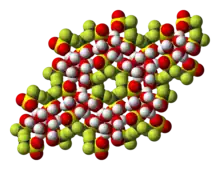 | |
 | |
| Names | |
|---|---|
| IUPAC name
Scandium trifluoromethanesulfonate | |
| Identifiers | |
3D model (JSmol) |
|
| ChemSpider | |
| ECHA InfoCard | 100.157.499 |
PubChem CID |
|
CompTox Dashboard (EPA) |
|
| |
| |
| Properties | |
| C3F9O9S3Sc | |
| Molar mass | 492.16 g/mol |
| Hazards | |
| Safety data sheet (SDS) | Oxford MSDS |
Except where otherwise noted, data are given for materials in their standard state (at 25 °C [77 °F], 100 kPa).
Infobox references | |
Scandium trifluoromethanesulfonate, commonly called scandium triflate, is a chemical compound with formula Sc(SO3CF3)3, a salt consisting of scandium cations Sc3+ and triflate SO
3CF−
3 anions.
Scandium triflate is used as a reagent in organic chemistry as a Lewis acid.[1] Compared to other Lewis acids, this reagent is stable towards water and can often be used in organic reactions as a true catalyst rather than one used in stoichiometric amounts. The compound is prepared by reaction of scandium oxide with trifluoromethanesulfonic acid.
An example of the scientific use of scandium triflate is the Mukaiyama aldol addition reaction between benzaldehyde and the silyl enol ether of cyclohexanone with an 81% yield.[2]
 Sc(OTf)3-mediated aldol condensation
Sc(OTf)3-mediated aldol condensation
See also
References
- ↑ Deborah Longbottom (1999). "SYNLETT Spotlight 12: Scandium Triflate". Synlett. 1999 (12): 2023. doi:10.1055/s-1999-5997.
- ↑ S. Kobayashi (1999). "Scandium Triflate in Organic Synthesis". Eur. J. Org. Chem. 1999: 15–27. doi:10.1002/(SICI)1099-0690(199901)1999:1<15::AID-EJOC15>3.0.CO;2-B. Archived from the original on 2013-01-05.
Wikimedia Commons has media related to Scandium(III) triflate.
This article is issued from Wikipedia. The text is licensed under Creative Commons - Attribution - Sharealike. Additional terms may apply for the media files.